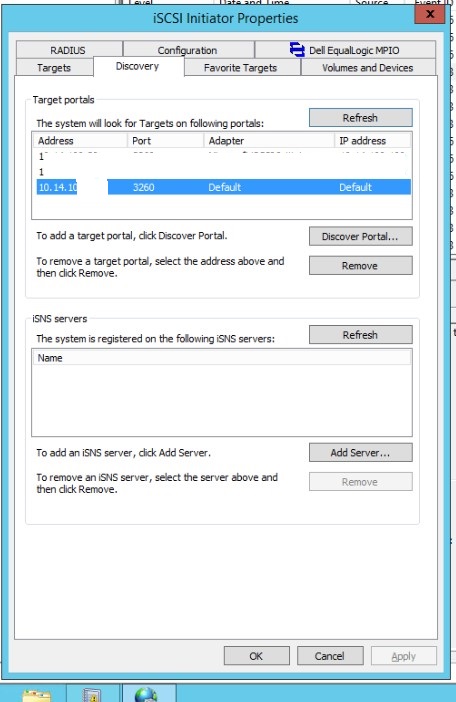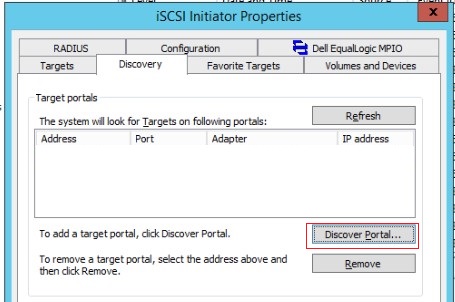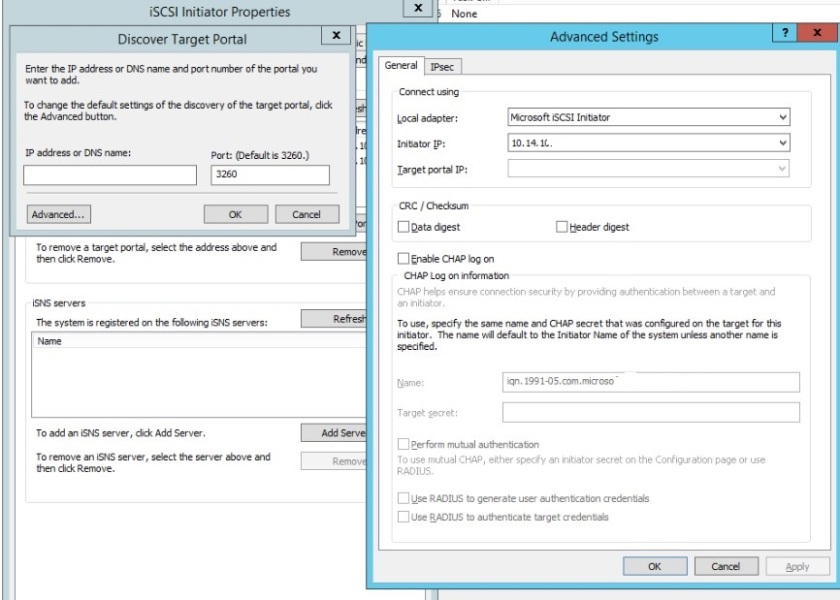IScsi was configured and working (setup by 3rd party). Server had problems (Dell) and some system boards (which had network cards on) were replaced.
ISCSI on server no longer working. It seems to be a result of the nic changes as 4 network cards lost their settings (the other 2 are parts of teams and can be resolved later).
Put simply and I am no iscsi expert. I/Dell cannot get the IScsi to reconnect to the device even though the nics have the right ip’s and can ping the storage interfaces. We removed all ghost entries/favourites as they felt this was the issue. They feel a server rebuild is on the step left. (Server is part of a hyper V cluster).
Is there anyone who has experience of ISCSI who may have a solution that doesn’t involve a server rebuild?
check
Best Answer

Do you have duplicates on the Initiator IP dropdown or the iSCSI adapter dropdown on the screen in your screenshot?
If the NICs are now recognised as new Adapters by windows the IP may be still resident as being bound to a no longer connected adapter and have duplicates in the list.
You can have MS iSCSI initiator do a round-robin/multipath between links be setting up MPIO.
Was this post helpful?
thumb_up
thumb_down
View Best Answer in replies below
Running Starwind 5.0 on Windows 2008 R2 64Bit
On the local machine I can ISCSI initiator to my targets on Starwind.
On my member server I can not connect to Starwind targets. It doesn’t show up when using ISCSI initiator and specifying the named host for my starwind targets, or just auto discovering.
The member server shows these eventid’s:
Log Name: System
Source: iScsiPrt
Date: 11/18/2009 10:37:35 AM
Event ID: 70
Task Category: None
Level: Error
Keywords: Classic
User: N/A
Computer: SEADC0.teameric.com
Description:
Error occurred when processing iSCSI logon request. The request was not retried. Error status is given in the dump data.
Event Xml:
<Event xmlns=”http://schemas.microsoft.com/win/2004/08/events/event”>
<System>
<Provider Name=”iScsiPrt” />
<EventID Qualifiers=”49152″>70</EventID>
<Level>2</Level>
<Task>0</Task>
<Keywords>0x80000000000000</Keywords>
<TimeCreated SystemTime=”2009-11-18T18:37:35.071928300Z” />
<EventRecordID>2955</EventRecordID>
<Channel>System</Channel>
<Computer>SEADC0.teameric.com</Computer>
<Security />
</System>
<EventData>
<Data>\Device\RaidPort0</Data>
<Binary>000004000100000000000000460000C0000000000000000000000000000000000000000000000000200100C0</Binary>
</EventData>
</Event>
Log Name: System
Source: iScsiPrt
Date: 11/18/2009 10:37:35 AM
Event ID: 1
Task Category: None
Level: Error
Keywords: Classic
User: N/A
Computer: SEADC0.teameric.com
Description:
Initiator failed to connect to the target. Target IP address and TCP Port number are given in dump data.
Event Xml:
<Event xmlns=”http://schemas.microsoft.com/win/2004/08/events/event”>
<System>
<Provider Name=”iScsiPrt” />
<EventID Qualifiers=”49152″>1</EventID>
<Level>2</Level>
<Task>0</Task>
<Keywords>0x80000000000000</Keywords>
<TimeCreated SystemTime=”2009-11-18T18:37:35.071928300Z” />
<EventRecordID>2954</EventRecordID>
<Channel>System</Channel>
<Computer>SEADC0.teameric.com</Computer>
<Security />
</System>
<EventData>
<Data>\Device\RaidPort0</Data>
<Binary>000006000100000000000000010000C0000000000000000000000000000000000000000000000000BC0CC0A8016F</Binary>
</EventData>
</Event>
Log Name: System
Source: MSiSCSI
Date: 11/18/2009 10:37:35 AM
Event ID: 113
Task Category: None
Level: Warning
Keywords: Classic
User: N/A
Computer: SEADC0
Description:
iSCSI discovery via SendTargets failed with error code 0xefff0003 to target portal *192.168.1.111 0003260 Root\ISCSIPRT
Issue and Logs
After checking through logs, I noticed that in 30 minutes interval we get bunch of Event ID 113 that source is MSiSCSI.

iSCSI discovery via SendTargets failed with error code 0xefff0024 to target portal *10.1.1.30 0003260 B06BDRV\L4SC&PCI_163A14E4&SUBSYS_045F1028&REV_20\5&6a108d3&0&30050200_0 .
Since, this host is part of Failover cluster, I was worried if we have some issues.
Based on Microsoft KB article it indicates the network issue.
Later on, since network is operational, and there was no iSCSI errors and IO issues, in further investigation i have noticed that this 30 minutes interval was actually refresh cluster interval initiated by System Center Virtual Machine Manager.
So, if I manually initiate host or cluster refresh from SCVMM console, we get those warnings.
On the end, the problem was with iSCSI discovery portal.
If you have setup your iSCSI discovery portal as shown bellow, you most likely will have warnings like shown above.
So the issue comes up if you have other network adapters that are not used for iSCSI traffic (most likely you have) and Discovery of portal is trying to discover portal from any adapter or any IP on adapter. (See in picture below the IP address is Default)

Resolution
To solve this, first remove wrong discovery portal.
Next step is to add iSCSI Portal properly configured:
Open Iscsi Initiator Properties-> Discovery Tab -> Discovery Portal

On next screen, populate IP address or DNS name of portal and click Advanced

Next screen is Advanced Settings of iSCSI Target Portal.
Choose as :
Local Adapter : Microsoft iSCSI Initiator (if you use MS iSCSI Initiator)
Initiator IP: choose IP address that is used for ISCSI traffic.

(Please note: If you have dual adapters for iSCSI as part of HA and FT design add iSCSI portal from both IP addresses.)

So after adding the portal, it would be good to reboot your server. So you can check if everything is in order and to check if will automatically connect to iSCSI targets.
With this configuration there are no more iSCSI warnings coming up. SCVMM refreshes the servers, and no more Event 113 warning showing up.
Hope it will help someone.
I installed some updates last night on one of my Windows Server 2012 R2 Hyper-V hosts. After restarting the iSCSI connection to my HP MSA p2000 G3 would not come back up. I have two hosts connected to this MSA and the 2nd host is connecting fine, even after a restart.
Nothing I have tried has had any effect, I get the same errors. There is nothing in the logs on the MSA that seem to point to an issue. I have opened a case with HP that I am waiting on getting a response on. Does anyone have any ideas?
Log Name: System
Source: MSiSCSI
Date: 11/11/2015 10:23:50 AM
Event ID: 113
Level: Warning
Keywords: Classic
Computer: SVRVS01.phjc.local
iSCSI discovery via SendTargets failed with error code 0xefff0003 to target portal *172.16.2.104 0003260 ROOT\ISCSIPRT\0000_0 .
*172.16.2.104 0003260 ROOT\ISCSIPRT\0000_0
Log Name: System
Source: iScsiPrt
Date: 11/11/2015 10:23:50 AM
Event ID: 1
Level: Error
Keywords: Classic
Computer: SVRVS01.phjc.local
Initiator failed to connect to the target. Target IP address and TCP Port number are given in dump data.
Log Name: System
Source: iScsiPrt
Date: 11/11/2015 10:23:50 AM
Event ID: 70
Level: Error
Keywords: Classic
Computer: SVRVS01.phjc.local
Error occurred when processing iSCSI logon request. The request was not retried. Error status is given in the dump data.
System Requirements:
- Windows Hyper-V Server 2012
- Windows Hyper-V Server 2012 R2
- Windows Server 2012
The Problem:
About 3 weeks ago, I completed the physical hardware installation of redundant NIC’s in a Hyper-V cluster that was backed onto a Windows Server 2012 server iSCSI SAN. The additional physical NIC’s were installed on the clients and communication between nodes worked as expected. The ports on the new NIC were placed into a new private address range of 192.168.100. Some were also removed from an existing multi-port NIC in the 192.168.254/24 range.
A couple of weeks later it came time to change the iSCSI SAN targets on the clients to use a the new adapters to move from 254/24 to 100/24.
New-IscsiTargetPortal -TargetPortalAddress 192.168.100.1
With the correct firewall and chap settings, it should have connected. Instead it returned
The firewall’s were OK, ping was OK. The DNS Connection Suffix, DNS Server (or lack of) were OK and NetBIOS over TCP/IP was disabled.
I could remove and reconnect the server using the original address without any problems.
More Info
Without wishing to be verbose on this one, the simple answer is that it appears to be a bug / limitation / “feature” of the iSCSI Target component of Server 2012. It was not a client issue.
The problem was that Windows had not been rebooted since standing up the new multi-port NIC (some 3 weeks prior). Yes, it was rebooted to put the hardware in, but once the NIC heads on the adapter had been configured it had not been rebooted subsequently.
It would appear that Storage Manager in Server 2012 does not force the iSCSI Target driver subsystem to re-parse the available adapter list.
In going into Server Manager > File and Storage Services > (right click the Storage server offering the iSCSI LUN) > iSCSI Target Settings
The list contained a number of network addresses that were REMOVED 3 weeks ago, but none of the NEW IPv4 or IPv6 addresses assigned to the new NIC were available.
Closing and re-opening Storage Manager made no difference.
The Fix
I sighed and being forced into unexpected maintenance on the cluster storage back end shutdown the cluster, updated drivers and firmware, cleared out Windows Update and rebooted.
After the reboot, all of the new addresses were available in Storage Manager and the redundant ones had disappeared.
So quite simply, reboot (or fully restart all iSCSI services).
Read these next.

Snap! Outlook crashes, getting phished, supermoon, CyberOne, DALL·E 2 + SpiceRex

Spark! Pro series – 12th August 2022

Repeated Attacks on my Firewall – What to Do ??

Laptop Video-Streaming?

How to color the text output in linux
Symptom
When an user tried to use iSCSI mount on a Data Protection for VMware Environment, the user will do the following procedure.
- Start the Data Protection for VMware Recovery Agent, and mount the target volumes in the panels of the Recovery Agent.
- Start the iSCSI Initiator program and tried to connect to the iSCSI target portal.
After step 2, the iSCSI target usually becomes visible in the target tab.
However, the SCSI target may remain invisible and then the following events may be logged in the Windows system log.
- Error yyyy/mm/dd/ hh:mm:ss iScsiPrt 70 None Error occurred when processing iSCSI logon request. The request was not retried. Error status is given in the dump data.
Error yyyy/mm/dd/ hh:mm:ss iScsiPrt 1 None Initiator failed to connect to the target. Target IP address and TCP Port number are given in dump data.
Warning yyyy/mm/dd/ hh:mm:ss MSiSCSI 113 None iSCSI discovery via SendTargets failed with error code 0xefff0003 to target portal *<portal-name> 0003260 Root\ISCSIPRT\0000_0 .
Cause
When the machine of Data Protection for VMware has two or more network interface controller (NIC), the Data Mount command may be bound for an unexpected NIC.
Then, iSCSI Software Initiator fails to connect to the iSCSI target portal via the expected NIC. As result, Event ID 1, 70, or 113 are logged in the system log.
Related Information
[{“Product”:{“code”:”SSERB6″,”label”:”IBM Spectrum Protect for Virtual Environments”},”Business Unit”:{“code”:”BU058″,”label”:”IBM Infrastructure w\/TPS”},”Component”:”Data Protection for VMware”,”Platform”:[{“code”:”PF033″,”label”:”Windows”}],”Version”:”Version Independent”,”Edition”:””,”Line of Business”:{“code”:”LOB26″,”label”:”Storage”}}]
